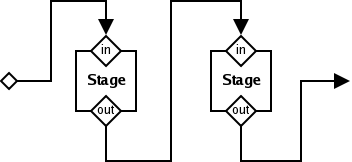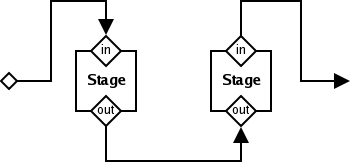Stage
This class represents a Stage in a Cascade cipher.
Each stage may be either an implementation of a Block Cipher Mode of
Operation (an instance of gnu.crypto.mode.IMode) or another
Cascade cipher (an instance of Cascade). Each Stage has
also a natural operational direction when constructed for inclusion
within a Cascade. This natural direction dictates how data
flows from one Stage into another when stages are chained together
in a Cascade. One can think of a Stage and its natural
direction as the specification of how to wire the Stage into the
chain.
The following diagrams may help understand the paradigm. The first
shows two stages chained together, each wired in the same direction
(Direction#FORWARD).

Figure 5: Stages wired in same direction
The second diagram shows two stages, one in a Direction#FORWARD
direction, while the other is wired in a Direction#REVERSED
direction.

Figure 6: Stages wired in different directions
| gnu.crypto.assembly.Stage DIRECTION
|
Variable |
A property name in the attributes map that is passed to the init
method, representing the stage's desired wiring direction. The mapped
value should be a valid gnu.crypto.assembly.Direction value. If
this attribute is omitted, Direction.FORWARD is used.
|
The following Factory methods, allow instantiation of concrete
Stage class instances that adapt instances of either
gnu.crypto.mode.IMode or (other) Cascade classes to
operate as a Stage in a Cascade:
| Stage getInstance (IMode mode, Direction forwardDirection)
|
Function |
Given a designated mode (an instance of gnu.crypto.mode.IMode,
and a Direction, this method returns a Stage instance that adapts
this designated mode to operate as a Stage in a Cascade.
|
| Stage getInstance (Cascade cascade, Direction forwardDirection)
|
Function |
Given a designated cascade (an instance of gnu.crypto.assembly.Cascade,
and a Direction, this method returns a Stage instance that adapts
this designated cascade to operate as a Stage in another
Cascade.
|
The following instance methods are also available:
| java.util.Set blockSizes ()
|
Function |
Returns the Set of supported block sizes for this Stage.
Each element in the returned Set is an instance of Integer.
|
| void init (java.util.Map attributes) throws java.security.InvalidKeyException
|
Function |
Initializes the stage for operation with specific characteristics.
Those characteristics are defined in attributes: a set of name-value
pairs that describes the desired future behavior of this instance. This
method throws an IllegalStateException if the instance is already
initialized. It throws an java.security.InvalidKeyException if the
key data (used to initialize the underlying Mode or Cascade) is invalid.
|
| int currentBlockSize () throws IllegalStateException
|
Function |
Returns the current block size for this stage. Throws an
IllegalStateException if the instance is not yet initialized.
|
|
Resets the stage for re-initialization and use with other characteristics.
This method always succeeds.
|
| void update (byte[] in, int inOffset, byte[] out, int outOffset)
|
Function |
Processes exactly one block of plaintext (if wired in the
Direction#FORWARD direction) or ciphertext (if wired in the
Direction#REVERSED direction), from in starting at
inOffset, and storing the resulting bytes in out, starting
at outOffset. An IllegalStateException will be thrown if
the stage has not yet been initialized.
|
| boolean selfTest ()
|
Function |
Conducts a simple correctness test that consists of basic symmetric
encryption / decryption test(s) for all supported block and key sizes of
underlying block cipher(s) wrapped by Mode leafs. The test also includes
one (1) variable key Known Answer Test (KAT) for each block cipher. It
returns true if the tests succeed, and false otherwise.
|


